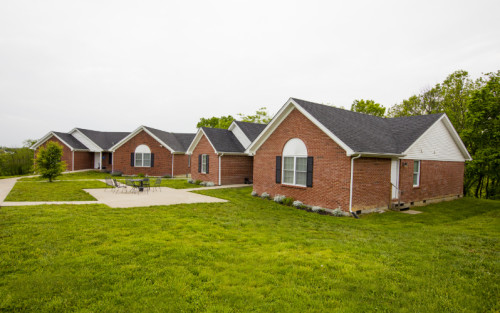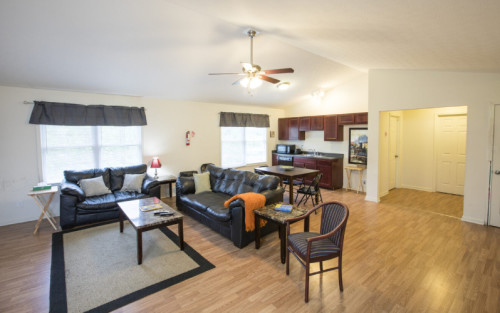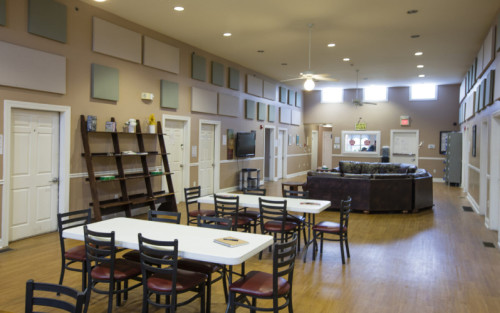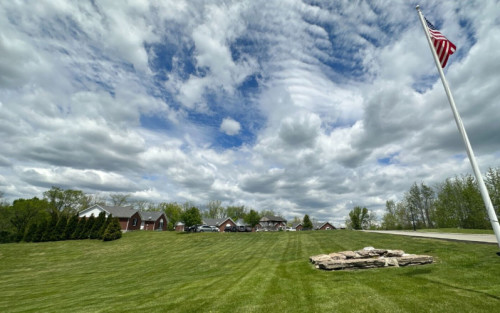






Recovery Works Georgetown
Treatment Focus
This center treats substance use disorders and co-occurring mental health conditions. Your treatment plan addresses each condition at once with personalized, compassionate care for comprehensive healing.
Primary Level of Care
Offering intensive care with 24/7 monitoring, residential treatment is typically 30 days and can cover multiple levels of care. Length can range from 14 to 90 days typically.
Claimed
Recovery.com has connected directly with this treatment provider to validate the information in their profile.
Treatment Focus
This center treats substance use disorders and co-occurring mental health conditions. Your treatment plan addresses each condition at once with personalized, compassionate care for comprehensive healing.
Primary Level of Care
Offering intensive care with 24/7 monitoring, residential treatment is typically 30 days and can cover multiple levels of care. Length can range from 14 to 90 days typically.
Provider's Policy
As soon as we learn the specifics of your situation – fully insured, under-insured, or self-pay – we develop a financial plan that matches your means and needs. Our staff collaborates with insurance companies to make the best use of your available benefits. If you’re self-pay, we work with you to create a plan that allows you to begin treatment as soon as possible. We accept Medicaid and most commercial insurances; self-pay options are also available. We admit patients 24 hrs a day, 365 days per year.
Recovery Works Georgetown
Recovery Works Georgetown
About Recovery Works Georgetown
Recovery Works rehabilitation center is located on 10 acres of land in the quiet countryside. In a calm and therapeutic setting, patients can feel at ease during the recovery process with on-site chefs, outdoor sports courts, and gender-specific lodging.
Levels Of Care
Recovery Works provides one-of-a-kind tailored treatment regimens designed to help restore balance in all aspects of life. Their detox program offers medical assistance during the uncomfortable and often dangerous drug and alcohol detoxification process. Detox can also include medication-assisted treatment (MAT), which uses medications to alleviate withdrawal symptoms. The residential treatment program is their highest level of care, which includes individual, family, or group therapy along with a variety of other treatment approaches. Patients are moved to a lesser level of care once they have met their mutually agreed upon residential goals. The next treatment phase is their partial hospitalization program (PHP). Partial hospitalization programs offer the same level of care as inpatient care while allowing patients to fulfill their obligations at home. An intensive outpatient program (IOP) builds on the foundations established in residential treatment, incorporating the same components while requiring less commitment with fewer hours each week. Recovery Works' alumni aftercare programs offer peer and community support along with case-management services. Graduates are invited to attend monthly group meetings amongst other alumni at no cost. Their recovery app instantly connects users to their alumni community, giving them access to a recovery support network at all times.
Treatment Methods
At Recovery Works, various therapy approaches are blended to develop a unique recovery plan for each patient. Evidence-based therapies are used in addition to group support and 1-on-1 trauma-informed therapy. Depending on the individual treatment objectives, recovery plans may include gender-specific groups, trigger identification, relapse prevention, coping strategies, life skills, or mindfulness and meditation practices. Cognitive behavioral therapy (CBT) and dialectical behavior therapy (DBT) are two of the most widely used clinical therapies. Patients can take part in recovery-focused, experiential treatments, including music, art, and recreational therapy. Recovery Works also provides community-based support groups like Medication Assisted Recovery Anonymous (MARA), as well as spiritual and non-12-Step meetings.

Center Overview
Treatment Focus
This center treats substance use disorders and co-occurring mental health conditions. Your treatment plan addresses each condition at once with personalized, compassionate care for comprehensive healing.
CARF Accredited
CARF stands for the Commission on Accreditation of Rehabilitation Facilities. It's an independent, non-profit organization that provides accreditation services for a variety of healthcare services. To be accredited means that the program meets their standards for quality, effectiveness, and person-centered care.

Insurance Accepted
Cash Pay Rates
Estimated Cash Pay Rate
Center pricing can vary based on program and length of stay. Contact the center for more information. Recovery.com strives for price transparency so you can make an informed decision.
Levels of Care







Your Care Options
Specializations
Drug Addiction
Drug addiction is the excessive and repetitive use of substances, despite harmful consequences to a person's life, health, and relationships.
Gender-specific groups
Patients in gender-specific groups gain the opportunity to discuss challenges unique to their gender in a comfortable, safe setting conducive to healing.
Who We Treat
Older Adults
Addiction and mental health treatment caters to adults 55+ and the age-specific challenges that can come with recovery, wellness, and overall happiness.
Men and Women
Men and women attend treatment for addiction in a co-ed setting, going to therapy groups together to share experiences, struggles, and successes.
Midlife Adults
For adults ages 40+, treatment shifts to focus on the unique challenges, blocks, and risk factors of their age group, and unites peers in a similar community.
Approaches
Spiritual Emphasis
Spirituality connects patients to a higher power and helps strengthen their recovery, hope, and compliance with other treatment modalities.
Evidence-Based
A combination of scientifically rooted therapies and treatments make up evidence-based care, defined by their measured and proven results.
Family Involvement
Providers involve family in the treatment of their loved one through family therapy, visits, or both–because addiction is a family disease.
Holistic
A non-medicinal, wellness-focused approach that aims to align the mind, body, and spirit for deep and lasting healing.
Individual Treatment
Individual care meets the needs of each patient, using personalized treatment to provide them the most relevant care and greatest chance of success.
Non 12 Step
Non-12-Step philosophies veer from the spiritual focus of the 12-Steps and instead treat the disease of addiction with holistic or secular modalities.
Twelve Step
Incorporating spirituality, community, and responsibility, 12-Step philosophies prioritize the guidance of a Higher Power and a continuation of 12-Step practices.
Gender-Specific
Separate treatment for men or women can create strong peer connections and remove barriers related to trauma, shame, and gender-specific nuances.
Therapies
Meditation & Mindfulness
A practiced state of mind that brings patients to the present. It allows them to become fully aware of themselves, their feelings, and the present moment.
Art Therapy
Visual art invites patients to examine the emotions within their work, focusing on the process of creativity and its gentle therapeutic power.
Family Therapy
Family therapy addresses group dynamics within a family system, with a focus on improving communication and interrupting unhealthy relationship patterns.
Medication-Assisted Treatment
Combined with behavioral therapy, prescribed medications can enhance treatment by relieving withdrawal symptoms and focus patients on their recovery.
Motivational Interviewing
Based on the idea that motivation to change comes from within, providers use a conversational framework to discover personalized methods for change.
Music Therapy
Singing, performing, and even listening to music can be therapeutic. Music therapy sessions are facilitated by certified counselors.
Nutrition Counseling
Nutritious food helps patients heal from within, setting them up for mental and bodily wellness as they learn about healthy eating.
Conditions We Treat
Grief and Loss
Grief is a natural reaction to loss, but severe grief can interfere with your ability to function. You can get treatment for this condition.
Anger
Although anger itself isn't a disorder, it can get out of hand. If this feeling interferes with your relationships and daily functioning, treatment can help.
Anxiety
Anxiety is a common mental health condition that can include excessive worry, panic attacks, physical tension, and increased blood pressure.
Bipolar
This mental health condition is characterized by extreme mood swings between depression, mania, and remission.
Depression
Symptoms of depression may include fatigue, a sense of numbness, and loss of interest in activities. This condition can range from mild to severe.
Obsessive Compulsive Disorder (OCD)
OCD is characterized by intrusive and distressing thoughts that drive repetitive behaviors. This pattern disrupts daily life and relationships.
Trauma
Some traumatic events are so disturbing that they cause long-term mental health problems. Those ongoing issues can also be referred to as "trauma."
Substances We Treat
Alcohol
Using alcohol as a coping mechanism, or drinking excessively throughout the week, signals an alcohol use disorder.
Benzodiazepines
Benzodiazepines are prescribed to treat anxiety and sleep issues. They are highly habit forming, and their abuse can cause mood changes and poor judgement.
Co-Occurring Disorders
A person with multiple mental health diagnoses, such as addiction and depression, has co-occurring disorders also called dual diagnosis.
Cocaine
Cocaine is a stimulant with euphoric effects. Agitation, muscle ticks, psychosis, and heart issues are common symptoms of cocaine abuse.
Drug Addiction
Drug addiction is the excessive and repetitive use of substances, despite harmful consequences to a person's life, health, and relationships.
Heroin
Heroin is a highly addictive and illegal opioid. It can cause insomnia, collapsed veins, heart issues, and additional mental health issues.
Methamphetamine
Methamphetamine, or meth, increases energy, agitation, and paranoia. Long-term use can result in severe physical and mental health issues.
Opioids
Opioids produce pain-relief and euphoria, which can lead to addiction. This class of drugs includes prescribed medication and the illegal drug heroin.
Languages
Aftercare
Care Designed for Your Needs
Personal Amenities
Amenities
Special Considerations
Gender-specific groups
Patients in gender-specific groups gain the opportunity to discuss challenges unique to their gender in a comfortable, safe setting conducive to healing.
Activities
Off-Site Activities

What people are saying
Treatment
3.9
Accommodations
3.6
Food & Nutrition
4.0
Value
3.9
John
Reviewed 02/06/25
Review from Rehabs.com
Bradley Preston
Reviewed 11/19/24
Review from Rehabs.com
Dre
Reviewed 08/03/19
Review from Rehabs.com
Anon
Reviewed 01/03/19
Review from Rehabs.com
Marie
Reviewed 09/19/18
Review from Rehabs.com





